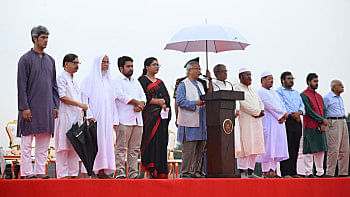What Washington Accord’s full signatory status means for Bangladesh’s engineering education

Bangladesh became a full signatory to the Washington Accord (WA) of the International Engineering Alliance (IEA) recently. This puts Bangladesh on the world map as having attained an internationally bench-marked quality assurance system in engineering education. Other full signatories to the WA include advanced countries like US, UK, Canada and Australia as well as neighbouring nations–India, Pakistan, Malaysia, Singapore etc.
The Washington Accord is an international agreement between accreditation bodies of different countries for undergraduate engineering degree programmes. The Institution of Engineers, Bangladesh (IEB) represents Bangladesh on the WA. In 2011, IEB established the Board of Accreditation for Engineering and Technical Education (BAETE) as an independent and autonomous body to carry out the accreditation of engineering degree programmes in this country.
Becoming a full signatory of the WA means a lot to different stakeholders. It is a testimony that BAETE has achieved the capability to establish policies, procedures, criteria, and related systems to conduct accreditation of engineering degree programmes. For Bangladesh, it is an international recognition that this country is able to provide high quality engineering education. It elevates the accredited engineering programmes in Bangladesh to world-class standards. This should give local and foreign companies confidence that they can have access to a pool of globally recognised engineering talents in the country. This is a key prerequisite for attracting foreign direct investment, particularly in the high-tech sector.
The accredited programmes, under the WA, gain substantial equivalency recognition and their graduates can enjoy mobility between signatory countries and access to job opportunities worldwide. Universities offering the accredited programmes receive global acceptance and can attract international students seeking recognised engineering degrees. Accreditation is a means of promoting quality by encouraging healthy competition among different degree programmes at the same institution and among similar programmes at different institutions.
Since its inception, BAETE has been working to improve the quality of engineering education in the country through quality assurance and accreditation. It received the provisional status at the WA in 2016 in recognition of making significant progress to that end. BAETE has been following the WA criteria to assess engineering programmes for accreditation.
Under the WA, engineering programmes are required to implement outcome based education (OBE). OBE is a learner‐centred approach which focuses on student outcomes, i.e., what a student is able to do in the real world upon the completion of their educational programme. BAETE's accreditation criteria are designed to ensure that a programme produces all-rounded engineering graduates who have the knowledge, skills and attitude to work as professional engineers. BAETE evaluates an engineering programme for accreditation based on ten criteria, among which programme outcomes and assessment, and curriculum and teaching-learning processes are crucial. A programme must prepare graduates with sound knowledge of fundamental science and engineering principles, and adequate professional competence so that the graduates have the ability to solve real life complex engineering problems. Since real life problems are rarely "purely technical", graduates must have the ability to assess possible engineering solutions from societal, health, safety, legal, ethical, sustainability and cultural points of views. They must have the ability to communicate effectively and act as leaders as well as good team players. An engineering programme seeking BAETE accreditation under the WA must also demonstrate that it is engaged in continual quality improvement.
So far, BAETE accredited 78 engineering programmes of 30 universities in the country. Strengthened by the highest recognition, BAETE should now widen its net to draw in the remaining of the engineering programmes of the country. One of the primary tasks of BAETE is to act as a regulator to make sure that requisite quality standards are met by the programmes. But taking into account the local context, BAETE should also extend its role as a facilitator and help different universities and faculty members in capacity building. There is a need to enhance the capacity of the engineering programmes in formulating and dispensing outcome-based education in a sustainable manner.
Bangladesh established the Bangladesh Accreditation Council (BAC) in 2018 to oversee quality assurance and accreditation of higher education in different subject areas in this country. Now that BAETE received the highest international recognition, BAC should consider giving recognition to programmes accredited by BAETE. Similar arrangements are made for professional programmes like engineering in other countries. Otherwise, it will be redundant and a sheer wastage of time and effort if an engineering programme has to go through accreditation procedures at two different agencies.
It may be noted that the International Engineering Alliance, which is also supported by the World Federation of Engineering Organisations (WFEO) and the United Nations Educational, Scientific and Cultural Organization (UNESCO), takes a holistic view on education for the wide spectrum of engineering. It divides engineering into three levels: 1) engineering degree programmes, 2) engineering technology programmes, 3) engineering technicians' educational requirements. In order to achieve developed country status, Bangladesh needs high quality engineering professionals not only at the degree level, but also at the two other levels. While engineering degree programmes are covered by the Washington Accord, engineering technology programmes and engineering technicians' educational requirements are governed respectively by the Sydney Accord and Dublin Accord of the IEA. Educational and professional leaders and policy makers in the country should take a holistic view on the quality of education for the whole spectrum of engineering professionals, and ensure quality assurance and accreditation for the other two levels as well.
Highly dedicated and hardworking teams of academics and professional engineers have been working over the years on a voluntary basis under the BAETE leadership to achieve WA's full signatory status. Successive leadership of IEB, including the current one, have been persistently working to this end. Their contributions, as well as the leadership role played by the late Prof Jamilur Reza Choudhury in elevating the quality of engineering education in this country through establishing and spearheading BAETE must be acknowledged.
Dr A.S.M.A. Haseeb is professor and head of the Department of Nanomaterials and Ceramic Engineering, BUET.
Views expressed in this article are the author's own.
Follow The Daily Star Opinion on Facebook for the latest opinions, commentaries and analyses by experts and professionals. To contribute your article or letter to The Daily Star Opinion, see our guidelines for submission.

 For all latest news, follow The Daily Star's Google News channel.
For all latest news, follow The Daily Star's Google News channel. 







Comments